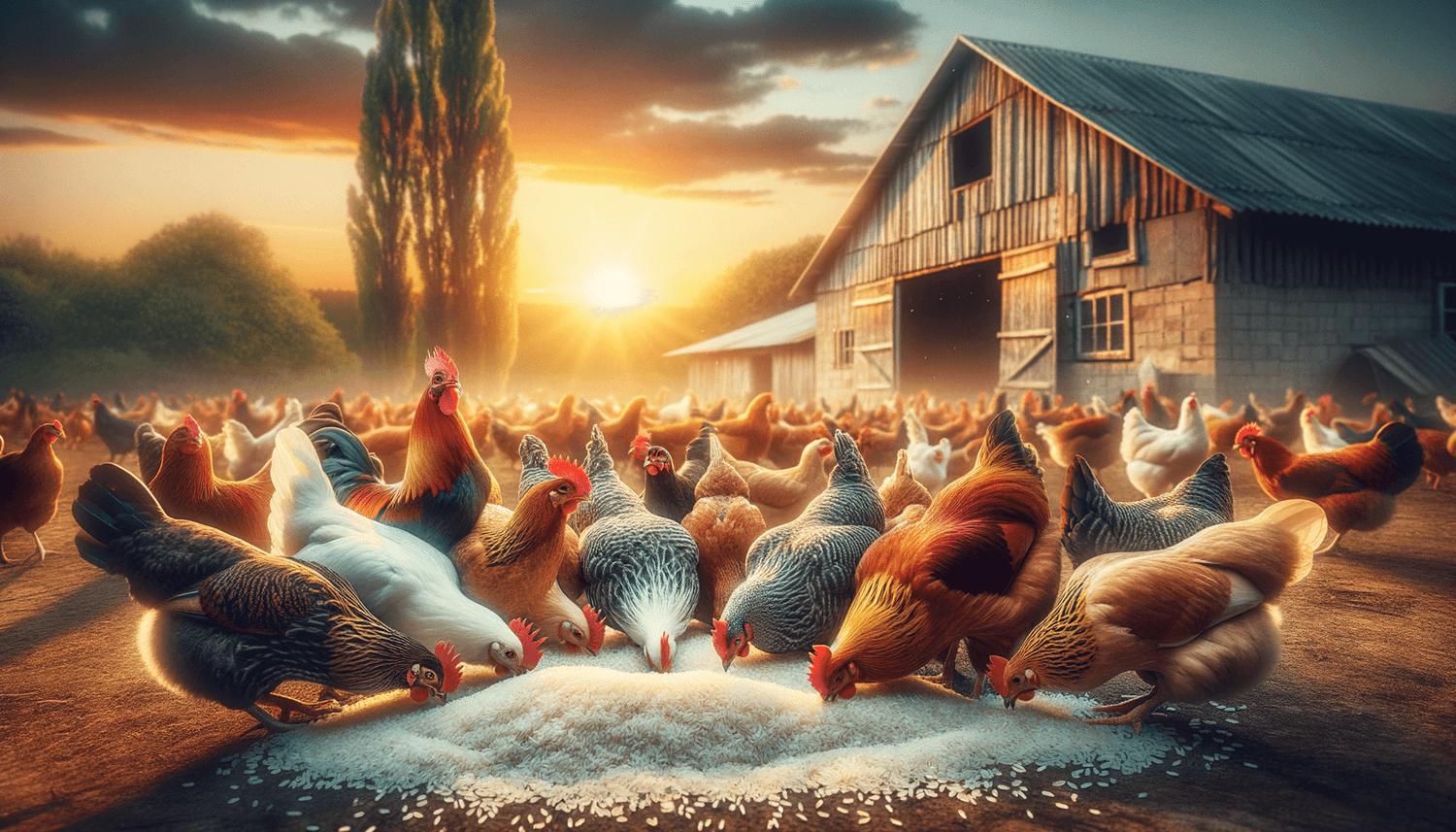Calling all backyard chicken enthusiasts! Are you in for a clucking good time? 🐔 Well, today we’re putting on our investigative beaks as we delve into one of the most egg-citing and often debated topics in the chicken world: Can our feathery friends indulge their taste buds with rice? In this un-peck-able blog post, we’ll explore whether rice is a suitable treat for our beloved birds, the importance of a well-balanced diet, the nutritional value and potential risks, and of course, the proper way to treat your flock to this scrumptious grain. It’s time to dig in and scratch up the dirt on this tasty topic!
Can chickens eat rice?
Yes, chickens can eat rice, and it is generally safe for them. In moderation, rice can be a nutritious and healthy treat for your flock. However, it is essential to cook the rice before feeding it to them, as uncooked rice could lead to potential digestive issues.
A balanced diet for healthy chickens
Just like us humans, chickens thrive on a balanced diet that provides them with all the necessary nutrients to maintain good health. The foundation of a healthy chicken’s diet should be a high-quality chicken feed, which ensures they receive the proper balance of vitamins, minerals, and essential nutrients to support their growth, egg production, and overall health. This chicken feed should make up around 80-90% of their diet, allowing your flock to meet their daily nutritional needs adequately.
Of course, variety is the spice of life, even for our feathered friends! So, the remaining 10-20% of their diet can be composed of a delightful array of treats, such as fruits and vegetables. Not only do these treats provide additional nutrients, but they also play a crucial role in keeping your chickens engaged, happy, and entertained in their environment. Remember, a happy and well-fed chicken is a productive and healthy chicken. Just be mindful of not overindulging your birds, as too many treats can lead to nutritional imbalances or obesity problems.
Nutritional value of rice for chickens.
Feeding rice to chickens can offer some nutritional value, as rice is a good source of carbohydrates, which are used for energy. This energy is essential for chickens to carry out their daily activities, forage, and lay eggs. While rice may not be the most nutrient-dense treat, it does serve as a satisfying snack for your flock.
When it comes to vitamins and minerals, rice provides a modest amount of B vitamins, such as thiamine, riboflavin, and niacin. B vitamins play a key role in supporting a chicken’s overall health and well-being, contributing to metabolism and energy production. However, rice should not be relied upon as the sole source of these vital nutrients, as it lacks the diversity and quantity needed for optimal chicken health.
It’s also worth noting that rice can offer some hydration to your chickens. As the rice absorbs water during the cooking process, it will provide a small amount of moisture to your flock when they consume it. While this isn’t enough to replace their regular water sources, the added moisture can be beneficial, especially during hot weather or when chickens may require additional hydration.
In summary, while rice may not be the most nutritionally rich option to feed your chickens, it does provide some benefits such as carbohydrates for energy, modest amounts of B vitamins, and slight hydration. As long as it’s fed in moderation and as part of a balanced diet that meets all their nutritional needs, rice can be an enjoyable treat for your chickens.
Nutrition table of rice for chickens.
| Information | Description |
|---|---|
| Nutritional Value | Rice provides carbohydrates for energy and modest amounts of B vitamins. |
| Suggested Serving Size | Small amounts, a handful at a time, alongside a balanced diet. |
| Safe Feeding Practices | Ensure rice is cooked before feeding to prevent digestive issues. |
| Preparation | Cook rice and allow it to cool before offering it to your chickens. |
| Potential Risks | Overfeeding rice can lead to nutritional imbalances and obesity. |
| Hydration | Rice offers a small amount of hydration, helpful during hot weather. |
| Digestion | Cooked rice is easily digestible and poses minimal risks. |
| Seasonal Availability | Rice is available year-round, making it a convenient treat option. |
| Other Benefits | Rice can help keep your chickens engaged, happy, and entertained. |
Variety is key
Although rice can be a nutritious treat for your chickens, remember that they’ll also appreciate a variety of other treats to keep things interesting. Some examples include fruits and vegetables such as leafy greens, berries, and tomatoes. Offering a diverse array of treats ensures that your flock stays engaged and receives a combination of vitamins, minerals, and other essential nutrients from these supplemental sources.
What to avoid
While there are many suitable treats for your backyard chicken friends, it’s important to be vigilant about what you should not feed them. In general, avoid salty or sugary foods, chocolate or cocoa-based items, raw or dried beans, green potatoes, or any moldy or spoiled foods. These substances can be toxic and harmful to a chicken’s health, potentially leading to illness or even death.
Engaging your flock
Feeding your chickens treats like rice can also serve as an opportunity to provide enrichment and stimulate natural behaviors. For example, you can scatter cooked rice or other treats around their run, encouraging them to scratch and forage for their snacks. This activity helps mimic their natural foraging instincts, keeps them entertained, and may even reduce boredom-induced behaviors such as feather pecking or aggression.
Final thoughts
So, yes, chickens can safely eat rice, provided it is cooked and fed in moderation as part of a balanced diet. Keep in mind the importance of variety, safe feeding practices, and engaging your flock to ensure your chickens remain healthy, happy, and productive members of your backyard family. Happy chicken keeping!

















